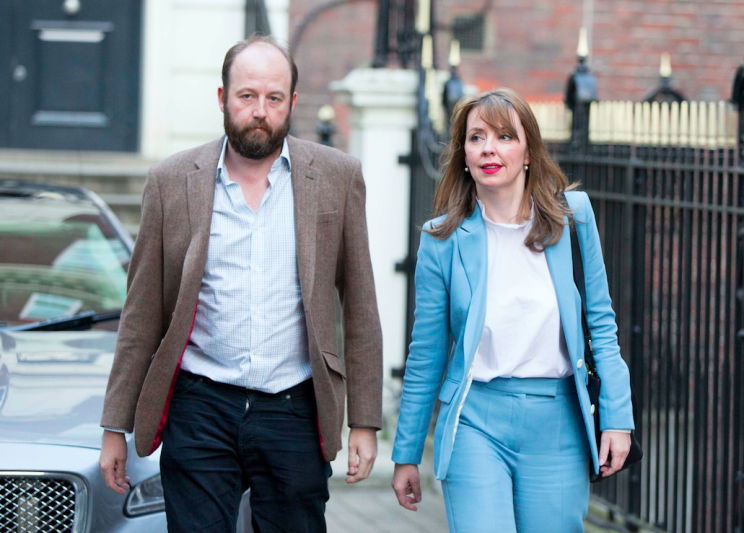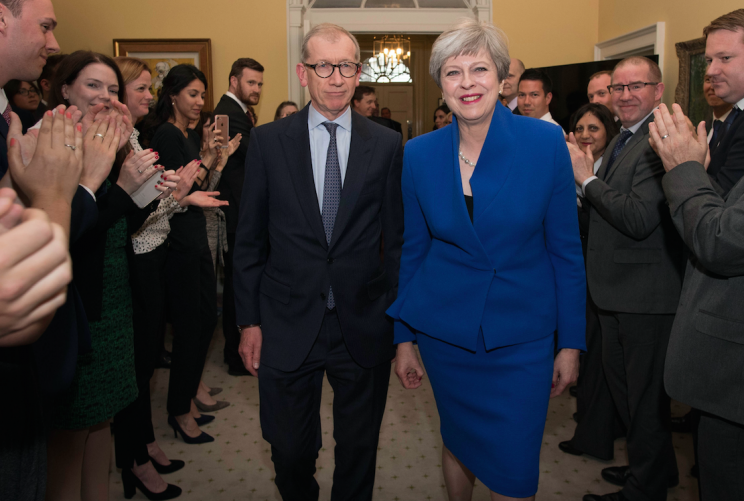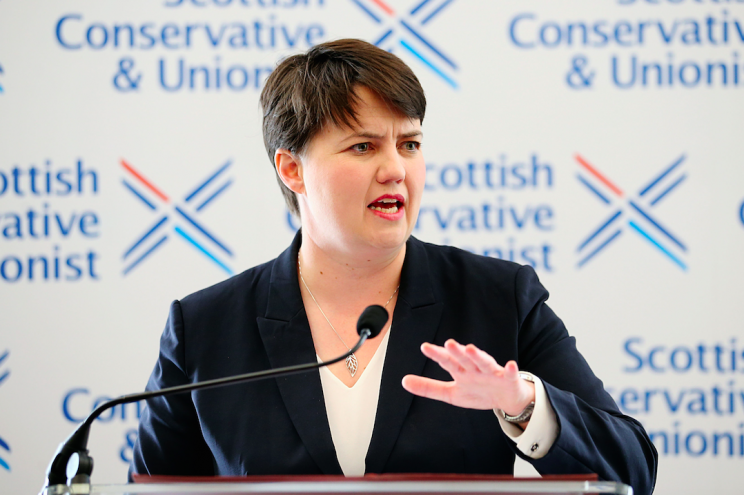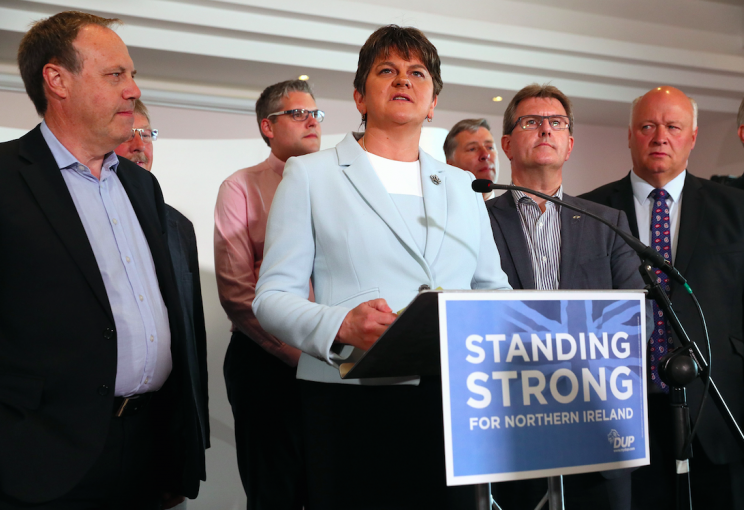Theresa May should resign after election disaster, say two-thirds of Conservative Party members

Theresa May clinging on to power with DUP deal
PM’s inner circle blamed for humiliating defeat
Two-thirds of Conservative members want her to resign
A petition to block the DUP deal passes 400,000 signatures
Tory figures criticise DUP’s record on abortion, same-sex marriage
Scottish Tory leader says May has given her assurances over gay rights
Nationalists warn of deal’s threat to peace process
Labour takes Kensington for the first time EVER
Prime minister retains all members of key cabinet team
Theresa May will desperately cling to power despite a mountain of problems stacking up against her.
On a day in which pressure intensified, the Prime Minister initiated formal coalition talks with the DUP despite suggestions that this could put the Northern Irish peace deal at risk; saw two of her closest advisers quit; and was battered by a new poll showing support by the party faithful plummeting.
Almost two-thirds of Conservative Party members say she should resign after her general election disaster.
A snap survey by the Conservative Home website found that 60 per cent of Tories believe the prime minister has to go.
It comes as two of the PM’s closest advisers, Nick Timothy and Fiona Hill, quit suddenly after they were blamed for the humiliating result. They had been ‘destructive and arrogant‘, a former communications aide to Mrs May said.

Many Tories blamed them for calling the election and for helping craft such a damaging election strategy including a number of damaging policies such as the “dementia tax“.
However, writing on the ConservativeHome website, Mr Timothy denied claims he was responsible for the controversial plans.
He wrote: “I would like to make clear that the bizarre media reports about my own role in the policy’s inclusion are wrong: it had been the subject of many months of work within Whitehall, and it was not my personal pet project. I chose not to rebut these reports as they were published, as to have done so would have been a distraction for the campaign.”
Of the 1,500 Tory Party members polled, only 36% thought Mrs May should stay.
‘It is the most damning finding in one of our polls that I can remember,’ said the site’s editor, Paul Goodman.
‘Party members and our readers are angry in the election’s aftermath. That two in three of her own members, according to this survey, believe that a Conservative leader should resign is astonishing.’
Meanwhile, an online petition set up to stop the Conservatives forming a new government with the DUP has attracted more than 400,000 signatures.
There has also been widespread criticism over Mrs May’s willingness to jump into a bed which has anti-women and anti-gay policies.
Some reports earlier on Monday claimed the Prime Minister would face a leadership challenge if Hill and Timothy weren’t sacked.
The Telegraph quoted a cabinet source as saying there would be ‘open warfare’ if they are not sacked within the next 48 hours.
Seemingly undeterred, Mrs May is set to name the rest of her Cabinet team on Saturday in the wake of the election humiliation.

The prime minister is still reeling from the result of Thursday’s poll in which she failed to secure an overall majority of seats in the House of Commons.
She was forced to seek a hurried deal with Northern Ireland’s Democratic Unionist Party in an attempt to prop up her new government, as her position was severely weakened.
Although her party came out of the poll the strongest, with 318 seats it fell short of the 326 mark needed for a majority, leaving Mrs May to turn to the DUP and its 10 seats for support.
Before the vote, there was speculation that the prime minister would use a predicted huge win at the polls to shake up her cabinet, but any such plans have gone out the window.
Instead, Downing Street revealed on Friday that she will stick with her key personnel – chancellor Philip Hammond, foreign secretary Boris Johnson, home secretary Amber Rudd, defence secretary Michael Fallon and Brexit secretary David Davis will all keep their roles.
Any changes to her cabinet will only arise from the departure of the eight ministers who lost their seats in the snap general election.
Mrs May’s decision to deal with the DUP drew criticism within the Conservative Party ranks.
GENERAL ELECTION RESULT 17: MORE POLITICAL ANALYSIS FROM YAHOO UK
DUP Wikipedia page locked after prankster edit it claiming party was founded by Hitler
The seven challenges facing Theresa May in the next few days
Jeremy Corbyn’s turnaround draws praise from his fiercest critics
Five reasons why Theresa May’s snap election backfired so badly
Who are the Democratic Unionist Party and what do they believe in?
The bookies have predicted ANOTHER general election later this year
‘We all f**king hate her!’ What one Senior Tory MP told Peston about PM
The General Election 2017 voter turnout was the highest in 25 years
Scotland’s Tory leader, Ruth Davidson, who in contrast with Mrs May had a successful election night north of the border, took a very public swipe at the prime minister’s move to welcome the DUP into the government fold.
Ms Davidson, who became engaged to her partner Jen Wilson last year, tweeted a link to a speech she made in Belfast in support of same-sex marriage, something the DUP opposes vehemently.
Ms Davidson later said she had received assurances from the prime minister over gay rights.

She told the BBC: ‘I was fairly straightforward with her (Mrs May) and I told her that there were a number of things that count to me more than the party.
‘One of them is country, one of the others is LGBTI rights.
As a Protestant Unionist about to marry an Irish Catholic, here's the Amnesty Pride lecture I gave in Belfast…https://t.co/NdRaT2s3W5
— Ruth Davidson (@RuthDavidsonMSP) June 9, 2017
‘I asked for a categoric assurance that if any deal or scoping deal was done with the DUP there would be absolutely no rescission of LGBTI rights in the rest of the UK, in Great Britain, and that we would use any influence that we had to advance LGBTI rights in Northern Ireland.’
Nationalist politicians are concerned that any Conservative/DUP deal could lead to an imbalance in Northern Ireland politics.
Sinn Féin’s Alex Maskey told BBC Newsnight: ‘I think this current arrangement may well prove to be reckless, but we will have to wait and see.
‘We will expect the British government to honour their commitments in respect of the Good Friday Agreement. And that means they have to remain neutral. We will watch what’s happening very carefully.’

Another headache for Mrs May came from calls within her own party to sack her joint chiefs of staff, Fiona Hill and Nick Timothy, who presided over her disastrous election campaign.
Former press chief Katie Perrior described the joint chiefs as ‘destructive’ and ‘arrogant’, saying they created a ‘toxic’ atmosphere at Number 10.
Former minister Anna Soubry said the pair should lose their jobs, while Conservative MP Heidi Allen speculated that Mrs May herself had no more than six months left in Downing Street.
But transport secretary Chris Grayling told BBC Question Time: ‘Not only must she not resign, she has to not resign in the interest of the country because we need to move forward, we have got to go into the Brexit negotiations.’
Asked if Mrs May should lead the Tories into the next election, Mr Grayling said: ‘The next election is a question for her.
‘My view is we need her to stay as prime minister and stay as prime minister for the foreseeable future.’
Labour’s strong showing was capped off when the party took the final seat to declare, Kensington, by just 20 votes.
It is the first time Labour has won the seat since it was established in 1974.

The win took Labour’s tally to 262 MPs as Jeremy Corbyn’s party secured a 40% share of the vote.
Mr Corbyn called on Mrs May to stand aside and let Labour form a minority administration.
The Liberal Democrats gained four seats to stand at 12 MPs, but saw former deputy prime minister Nick Clegg ousted from the Commons.
The SNP saw its tally fall from the 56 seats it secured two years ago to 35, while Ukip leader Paul Nuttall quit after a disastrous showing for the party.

 Yahoo News
Yahoo News 


